Choosing the Best Fishing Boat for Beginners
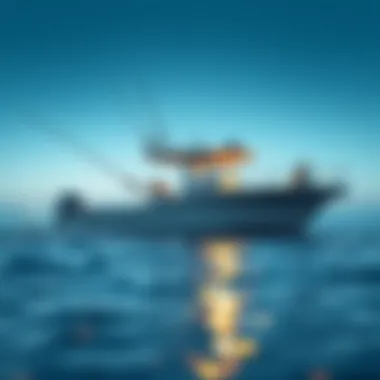
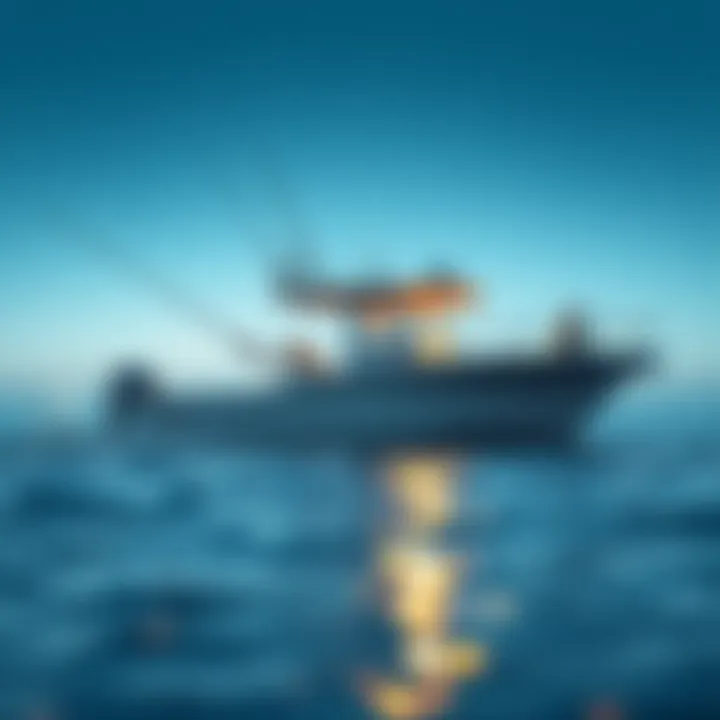
Intro
Fishing can be a delightful experience that combines relaxation with the thrill of the catch. For those just wading into this activity, selecting the right beginner fishing boat can be a daunting task. With a myriad of options available—from kayaks and canoes to larger motorboats—it's easy to feel overwhelmed by the choices. Understanding the nuances of each type, coupled with considerations of size, cost, and essential features, can set the foundation for many successful fishing outings.
As we dive deeper into this guide, expect to uncover critical insights into fishing boat trends, what consumers are currently drawn to, and expert recommendations tailored to novice anglers. This journey will equip you with the knowledge needed to choose a boat that not only fits your budget but also aligns with your unique fishing ambitions.
To kick things off, we will start with a market research overview to help frame the current landscape of beginner fishing boats.
Understanding the Basics of Fishing Boats
When stepping into the world of fishing, having a solid grasp on the basics of fishing boats can make a world of difference. For a beginner, the journey begins not just with the enthusiasm of casting a line but also with the important choice of the right vessel. Understanding what differentiates various boats, their purposes, and the specs that matter can lay a firm foundation for a satisfying fishing experience. Choosing the right boat impacts comfort, safety, and ultimately, the success of your fishing trips.
Defining What Constitutes a Beginner Fishing Boat
A beginner fishing boat typically offers user-friendly features that cater to novices entering the fishing scene. Characteristics to keep an eye on include light weight, ease of handling, and additional safety features. Unlike competitive fishing boats, which can be designed for speed or specialized techniques, a beginner fishing boat should prioritize stability and maneuverability. A good example could be a small aluminum boat with built-in flotation devices for added security, providing an excellent platform for catching panfish or bass on calm waters.
Several criteria help define what makes an ideal starter boat:
- Size: Generally, a boat between 10 to 16 feet long is more manageable for beginners.
- Weight: Lightweight models simplify transport and launching.
- Stability: Wider beams contribute to stabilty, reducing the risk of capsizing.
In essence, a boat ideal for a first-time angler is one that inspires confidence and minimizes complications.
The Importance of Selecting the Right Boat for Beginners
Choosing the right fishing boat is akin to setting the stage for a great journey ahead. If the boat fits the beginner's needs, it fosters a more engaging fishing experience; however, selecting ill-suited equipment can dampen the excitement quickly. One key aspect to consider is that fishing can be a calm and social experience, often enjoyed with family or friends. An accommodating boat allows the user to invite others, turning a solo trip into a shared adventure.
Safety also cannot be overlooked. Opting for boats that come equipped with reliable safety features can ease worries about mishaps on the water. An inexperienced boater grappling with unforeseen challenges could quickly become overwhelmed. Furthermore, beginner-friendly boats often come with warranties or support that assist novices in learning how to operate their new purchase effectively.
In summary, selecting the right boat for beginners is not a mere preference but an essential step in ensuring that the fishing experience is enjoyable, safe, and rewarding. Embracing these principles can set a solid foundation for a fulfilling fishing journey that could lead to a lifelong passion.
Types of Fishing Boats
Selecting the right fishing boat is a pivotal decision for any beginner angler. The type of boat can greatly influence the overall fishing experience, impacting everything from ease of use to comfort on the water. Each kind of fishing boat serves distinct purposes and environments, which is why understanding the nuances of each category is essential. Familiarity with different types allows newcomers to align their choices with specific fishing styles and preferences, while also aiding in safety and performance on the water. Fishing boat types can be broadly classified as Aluminum Boats, Polyethylene Boats, Fiberglass Boats, and Inflatable Boats. Let’s take a closer look at each.
Aluminum Boats
Aluminum boats are like the workhorses of the fishing world. Their lightweight structure makes them highly portable and easy to handle, especially for those who might be launching solo. An aluminum boat typically boasts durability, resisting corrosion and bumps that come with rough conditions—an appealing feature for novices who prefer not to stress over maintenance. Moreover, aluminum boats are fuel-efficient, which is a plus when thinking about costs in the long run.
However, it’s vital to recognize a few limitations. Generally, these boats can be a bit noisier compared to other types, and they may not offer the same level of comfort or space for larger groups. In summary, if easy transport and solid performance in freshwater are your priorities, an aluminum boat could be an ideal pick.
Polyethylene Boats
Next up are polyethylene boats, molded from a single piece of plastic. This manufacturing method results in a lightweight structure that’s quite forgiving against impacts, making them a secure choice for inexperienced anglers. Polyethylene are especially noted for their buoyancy and stability, which can be a significant confidence booster for beginners who may still be getting accustomed to balancing on the water.
These boats generally have a seamless design, preventing leaks, which is undoubtedly a bonus. However, while they can handle calmer waters well, they may struggle in rougher conditions. So, if your fishing adventures will primarily unfold in lakes or rivers, and you're looking for a reasonably priced, durable option, polyethylene boats might just do the trick.
Fiberglass Boats
Fiberglass boats bring a touch of elegance and comfort to the fishing game. Known for their smooth finishes and spacious designs, these boats can offer a more luxurious experience on the open water. They handle larger bodies of water effectively and stand up well against waves, giving novice fishers more confidence during outings. The stability and added storage areas make them excellent for group fishing trips or longer excursions.
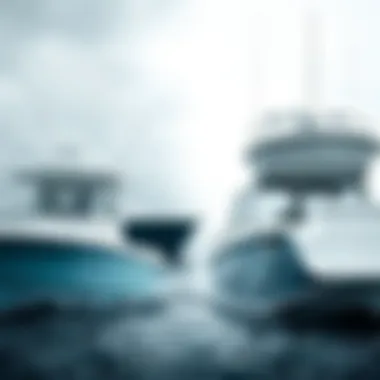
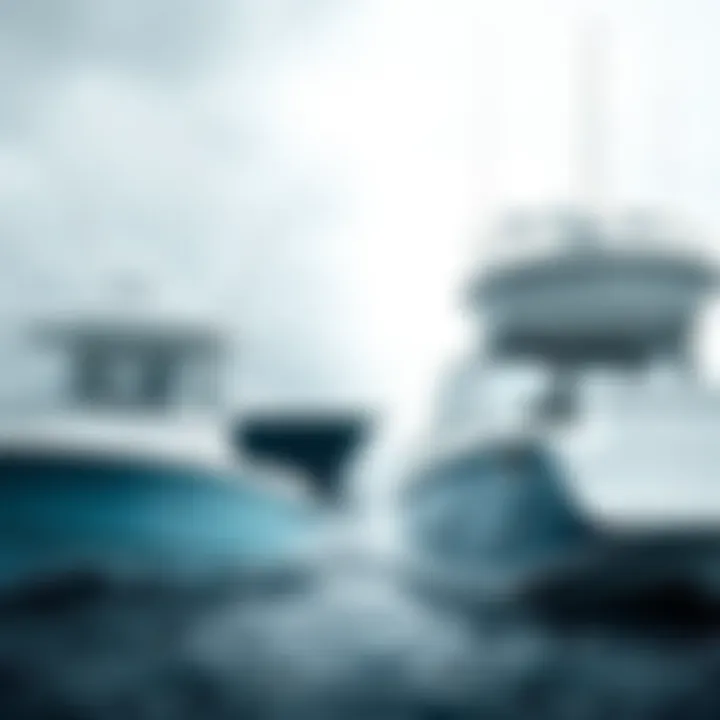
However, it's important to note that fiberglass boats generally come with a heftier price tag and require more diligent upkeep. Regular maintenance, such as waxing and cleaning, is necessary to keep them in pristine condition. Therefore, if you're leaning towards longer fishing experiences, fiberglas boats might be great for you, but be prepared to also invest time and money in maintenance.
Inflatable Boats
Then we have inflatable boats that are often the go-to choice for those seeking versatility and easy storage. They are especially suitable for beginners venturing into fishing at campsites or remote locations where transport may be tricky. Inflatable boats are lightweight and can be deflated for convenient storage, making them an appealing option for those with limited space.
Despite lacking some rigidity, modern inflatable boats are surprisingly sturdy and offer fair stability on calm waters. Some models even come equipped with fishing gear holders and additional compartments for storage. However, their performance may not quite match that of solid construction types in rough waters. If flexibility and ease of transport are what you're after, inflatable boats can serve you just right.
Choosing the right type of boat depends on your fishing habits, environment, and personal preferences. Take the time to explore the unique characteristics of each type to find the best match for your fishing adventures.
Key Features to Consider
When setting out to find the ideal beginner fishing boat, it's essential to take stock of key features that can make or break your experience on the water. Selecting a boat isn’t merely a matter of aesthetics or brand; it’s about functionality—how well the boat can adapt to your needs and the environments in which you'll be fishing. Diving into the intricacies of size, stability, storage, and transport can help ensure that your initial foray into fishing is enjoyable and resourceful.
Size and Capacity
The size of your fishing boat affects several factors, from the number of people it can accommodate to how easily it maneuvers in different water conditions. A smaller boat, for instance, might be ideal for a novice since it can usually be handled with ease and stored conveniently. Think about whether you'll be fishing alone or bringing friends along.
- Capacity Matters: Many beginner models, like Jon boats or bass boats, often range in length from 10 to 16 feet and can typically hold anywhere from two to four passengers depending on the design. This is important because, whether you’re fishing with family or just a couple of pals, the right capacity can mean the difference between a comfortable day on the water and feeling cramped and chaotic.
Stability and Safety Features
Stability is another cornerstone of a good beginner fishing boat. You want something that won’t tip over at the slightest wave or movement. A wider beam provides more stability, especially for those who may not have the best sea legs. Look closely at the boat's hull shape and weight distribution; a well-designed hull provides better tracking, which is beneficial for a smoother ride.
- Focus on Safety: For beginners, it's beneficial to have safety features like grab rails and non-slip surfaces. Familiarizing yourself with the boat’s safety equipment—life jackets, fire extinguishers, or even first-aid kits—shouldn't be overlooked. Passive safety, like built-in flotation or higher freeboard, also adds extra confidence when you're just getting started.
Storage Options
The practicality of storage should not be underestimated. Fishing equipment can quickly become a tangled web of fishing poles, tackle boxes, and personal items. Look for spaces where you can stow gear safely and conveniently.
- Innovative Storage Solutions: Many beginner fishing boats, such as center console models or deck boats, come equipped with built-in compartments or live wells for storing bait and catch, keeping them fresh until you're back on land. Additionally, consider how easy it is to access your gear while you’re out on the water. Having everything within reach can make your fishing operation run smoothly.
Ease of Transport
After spending a good amount of time choosing the right boat, you'll want to ensure it’s practical to transport. A light, compact boat is ideal for someone new to fishing who may not have a big truck or trailer. Consider how you will transport your boat to lakes or rivers, as some setups require more planning and equipment than others.
- Trailer Considerations: Think about the type of trailer you'll need and whether your vehicle can handle it. Some boats can go directly onto a roof rack, while others will require a specialized trailer. Knowing these details before you make a purchase can save a lot of headaches later down the line.
"Purchasing a boat should be like buying your favorite pair of shoes. Comfort and practicality should come first; the look can always follow."
In sum, the key features to consider are crucial to maximizing your fishing adventures. By paying close attention to size, stability, storage, and transport easiness, you'll be set up for more memorable, successful days on the water.
Understanding Your Fishing Environment
When stepping into the world of fishing, one pivotal aspect that beginner boaters cannot ignore is their fishing environment. Understanding how to navigate the waters you’ll be fishing in is crucial to not just maximizing your catch but ensuring your safety and enjoyment on the water. Different bodies of water come with their own set of rules, challenges, and opportunities that influence what type of fishing boat suits you best.
Freshwater vs. Saltwater Considerations
One of the first things to grapple with is the distinction between freshwater and saltwater environments. Each has unique characteristics, and understanding these can make a world of difference in your fishing experience.


- Freshwater: Lakes, rivers, and ponds typically host freshwater fishing. Here, the versatility of your boat is key.
- Saltwater: On the flip side, saltwater lakes and oceans introduce different dynamics.
- Freshwater boats often favor portability and ease of handling. Think lighter materials like aluminum or polyethylene.
- Waters are usually calmer, so stability plays a larger role, ensuring your boat can handle unexpected currents or fish thrashing.
- Boats for salty settings must be equipped to tackle harsher conditions, including corrosion-resistant materials and superior build quality.
- Waves and significant currents can quickly become a challenge in these spaces. A larger, sturdily built boat can provide better safety and stability.
Keep in Mind: If your preferences lean toward saltwater fishing, be prepared for potentially higher costs of maintenance to combat saltwater's corrosive effects.
Weather and Water Conditions
Mother Nature is both friend and foe in the world of fishing. Weather conditions can vastly affect your fishing experience, so staying informed is crucial. Here’s what to consider:
- Wind: A breezy day can whip up waves and present challenges for even seasoned fishermen. It’s wise to check wind patterns and avoid days of high winds unless your boat is equipped to handle them.
- Rain and Storms: It’s not always the sunny skys that etch out a good fishing day, but sudden storms can turn a joyful excursion into a perilous situation. Always check forecasts before setting out.
- Water Temperatures: Understanding how temperatures affect fish behavior is vital. Fish often respond to warmer or cooler temperatures quite distinctly, so aligning your fishing strategy with these patterns can lead to success.
- Tides and Currents: For those venturing into saltwater fishing, being aware of tidal changes and currents can hugely impact your catch. Currents alternate paths of fish, thus knowing the charting of these could spell the difference between an empty cooler and a bountiful catch.
In Summary: Knowledge of your fishing environment is not merely advantageous but necessary. Understanding whether you are more inclined toward freshwater or saltwater fishing, alongside the awareness of weather and water conditions, will guide you in selecting the most suitable beginner fishing boat. Be it a simple yet reliable aluminum boat for a tranquil lake or a robust fiberglass vessel for ocean journeys, your fishing environment should always inform your choice.
Budget Considerations
Fishing boats can bring immense joy and relaxation, but they also come with financial responsibilities. It's crucial for beginners to grasp budget considerations before diving headfirst into boat ownership. Understanding these factors not only helps avoid buyer's remorse but also ensures that your fishing adventures don't turn into financial burdens.
Determining Your Budget for a Fishing Boat
When setting out to buy a fishing boat, the first step is to determine how much you're willing to spend. This might seem straightforward, but there are several layers to consider. Prices for beginner fishing boats can vary widely based on the type, size, and additional features.
- Initial Outlay: Begin by choosing your price range. Smaller aluminum boats may start at around $1,500, while larger fiberglass vessels can cost upwards of $30,000. Think about what fits not just your finances but also your fishing aspirations. A small jon boat may suffice for tranquil lake outings, but if you're eyeing adventures in more challenging waters, be prepared to spend more.
- Financing Options: If your budget is tight, you might look into financing. It’s a good way to spread the costs over time, but ensure you don’t bite off more than you can chew. Monthly payments can quickly add up, and interest can throw a wrench in budgeting plans.
- Resale Value: Consider how much you might get back if you decide to sell the boat later. Some brands and types hold their value better than others. Research resale values can be helpful; forums and platforms like reddit.com can offer insights on what folks have experienced.
Before you formalize any decision, always account for hidden expenses like taxes, registration, and potential upgrades. It’s better to overestimate than underestimate.
Ongoing Costs of Boat Ownership
Owning a fishing boat isn’t merely about the initial purchase price. It carries ongoing costs that can pile up without careful consideration. Here are the recurring expenses that any potential boat owner should keep in mind:
- Insurance: Much like car insurance, protecting your investment with boat insurance is not optional. This can range anywhere from a few hundred to several thousand dollars annually, depending on the boat's value.
- Maintenance: Boats require regular upkeep, which can lead to significant expenses. Whether it’s routine cleaning, engine servicing, or fixing unexpected problems, budget for maintenance tasks to keep your boat in top shape.
- Storage Fees: If you’re not keeping the boat at home, storage costs can quickly add up, especially in populated areas. Many marinas charge monthly fees for dock space, while others might have seasonal storage options.
- Fuel Costs: Depending on how frequently and far you plan to travel, fuel can become a hefty expense. Factor in how efficient the boat is on fuel, especially if you plan on fishing in deeper waters or making lengthy trips.
Comparing Boat Options
When stepping into the world of fishing, making an informed decision about which vessel to choose is crucial. The process of comparing boat options goes beyond mere aesthetics or brand popularity; it involves a thorough examination of practicalities, budget constraints, and your specific fishing needs. For beginners, this stage is pivotal as it sets the tone for all future fishing endeavors. Choosing poorly at this juncture may lead to frustration or, worse, risk to safety on the water.
New vs. Used Boats
New boats often come with the latest tech and warranty protections that can provide peace of mind for first-time buyers. A shiny, brand-new fishing boat can be inviting, but it comes with a heftier price tag. A new vessel, such as the Tracker Grizzly or Lowe Stinger, might offer the latest fishing features and fuel efficiency, but is it truly necessary for a beginner? Consider the following:
- Benefits of Buying New:
- Warranty and manufacturer support: This means less worry if something goes wrong early on.
- Advanced features: Modern boats come equipped with better navigation systems and safety equipment designed for ease of use.
- Customization: You can often tailor new boats to fit your specific fishing style or preferences.
In contrast, a used boat can provide excellent value, assuming you do your due diligence. Buying secondhand means you might find a well-maintained vessel at a fraction of the original cost. However, this option carries its risks, such as hidden damage or outdated technology. Here's what to keep in mind:
- Advantages of Used Boats:
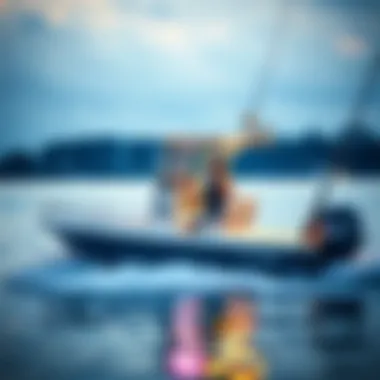
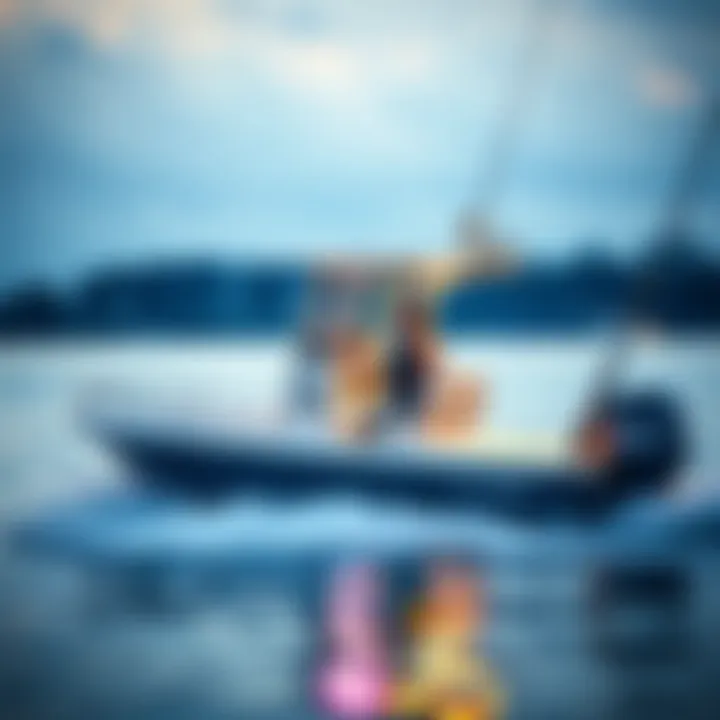
- Cost efficiency: Often significantly cheaper, allowing you to invest in gear, maintenance, or upgrades.
- Proven reliability: Older models have a track record, and you can access user reviews to gauge performance over time.
- Availability of options: You might stumble upon a gem that fits your needs perfectly, such as a solid Ranger 620FS with a good service history.
When navigating this choice, think about where and how often you plan to fish. If you're only dipping your toes into this hobby, perhaps a reliable used boat that gets you on the water without breaking the bank is the way to go. On the flipside, if you're committed to becoming regular on the water, a new boat might justify its cost in terms of the features and peace of mind.
Brand Reputation and Customer Reviews
The reputation of a boat brand carries weight. Well-established brands often ensure quality, performance, and customer service. Names like Boston Whaler and Yamaha have built their legacies by sticking to high standards. But what should you look for when investigating brand reputation and customer reviews?
- Before Buying:
- Research online forums and sites like reddit.com where enthusiasts share experiences with specific models. This is a treasure trove of real-world feedback.
- Consider visiting local boating communities or clubs to gather anecdotal evidence about various brands and their performance.
Interacting with other boaters can offer insights that manufacturer websites overlook. Moreover, customer reviews on retailers' websites can help you gauge the after-sales service and support provided by a particular brand. Look for patterns in the feedback—consistently poor reviews might indicate systemic issues with the boat or brand, while overwhelmingly positive reviews signal a reliable choice.
"New or used, the right boat is the one that fits your needs and your budget. Never rush the decision, as your enjoyment on the water will hinge on this choice."
In summary, the process of comparing boat options is a multi-faceted journey involving analysis of whether to purchase new or used, alongside a deep dive into brand reputation. This way, novice anglers can step confidently onto their boats, equipped not just with gear, but with a secure foundation in their choice of vessel.
Best Fishing Boats for Beginners
Selecting the right fishing boat is crucial for novices stepping into the vast world of angling. A boat serves as the vessel not only for fishing adventures but also for creating cherished memories on the water. Therefore, understanding the best fishing boats for beginners is a gateway to ensuring enjoyable and safe experiences. Factors like stability, ease of handling, and affordability stand out when considering options for first-time boat owners.
Identifying the right fishing boat can significantly influence one’s confidence and comfort level on the water. Beginners often find the intricacies of fishing daunting enough, so having a vessel designed for ease of use helps demystify the process. With beginner-friendly features, such as built-in storage and safety elements, anglers can focus more on fishing rather than navigating complicated equipment.
Furthermore, selecting a boat that aligns with a beginner's fishing interests—whether it be freshwater lakes or coastal waters—adds immense value. This guide aims to simplify your search, ensuring you make an informed investment that will resonate with your passion for fishing and exploration.
Top Recommendations Based on User Feedback
When searching for the best options, user feedback is valuable. After examining numerous reviews and forums, some boats have emerged as favorites among first-timers:
- Sun Dolphin Pro 120: This affordable Kayak is popular for its lightweight design and solid stability. Users praise it for easy maneuverability on rivers and lakes.
- Old Town Canoe Discovery 119: Celebrated for its spacious interior, this canoe provides a cozy fishing spot for solo trips or small groups. Fishermen appreciate its sturdy build and excellent tracking.
- Tracker Topper 1236: This aluminum boat is commended for its robustness and portability. Users often highlight its affordability and durable construction, making it a favorite for shallow waters.
- Sea Eagle 380x: An inflatable boat appreciated for its versatility and ease of transportation. Many reviews commend its ability to handle varied water conditions, making it a multi-use fishing tool.
All these options have garnered positive reviews and blend functionality with user-friendly features, perfect for a novice.
Comparative Analysis of Popular Models
To further assist in decision-making, let’s undertake a comparative analysis of several popular beginner fishing boats:
| Model | Type | Length | Capacity | Weight | Price | | Sun Dolphin Pro 120 | Kayak | 10 ft | 1 person | 27 lbs | $399 | | Old Town Canoe Discovery 119 | Canoe | 11.5 ft | 2 persons | 55 lbs | $799 | | Tracker Topper 1236 | Aluminum Boat | 12 ft | 2-3 persons | 180 lbs | $1,299 | | Sea Eagle 380x | Inflatable Boat | 12.5 ft | 3 persons | 26 lbs | $849 |
This table showcases how these models vary in terms of capacity, price, and type, allowing potential buyers to choose based on their specific needs.
Epilogue
Choosing the right beginner fishing boat is not just about picking a vessel that floats. It’s about aligning a variety of elements to ensure an enjoyable and successful fishing journey, especially for newcomers in this field. To help beginners navigate this significant decision, the conclusion ties together the core aspects discussed throughout the guide, emphasizing the importance of careful consideration.
Recap of Key Takeaways
- Define Your Needs: Understand what type of fishing you want to pursue—whether it's freshwater bass fishing or saltwater adventures—and choose a boat that fits those needs.
- Boat Types Matter: There’s a plethora of boat types available. Aluminum, polyethylene, fiberglass, and inflatable boats each have their unique attributes, affecting stability, maintenance, and overall user experience.
- Size and Safety: Bigger isn’t always better. Find a boat that offers the right capacity for your expected trips, while prioritizing stability and safety features for peace of mind on the water.
- Budget Planning: Establish a realistic budget, considering both the initial purchase and ongoing expenses. This will dictate your choices and ensure you don't overextend your finances.
- Read Reviews: Don't skip the brand reputation and customer feedback. Implementing insights from real users can guide you toward makes and models that consistently deliver satisfaction.
Final Thoughts on Choosing the Right Fishing Boat
When selecting a fishing boat, think of it like investing in a hobby rather than just a one-time purchase. A well-thought-out decision can lead to numerous successful fishing outings and unforgettable memories.
Moreover, being informed about your choices empowers you to not just pick a boat off a shelf but to select one that fits into your lifestyle and personal aspirations.
Fishing is about patience, skill, and enjoying nature, and the right boat can significantly enhance this experience. So take your time, analyze your options, and trust your instincts. Your ideal adventure awaits just beyond the shore.







